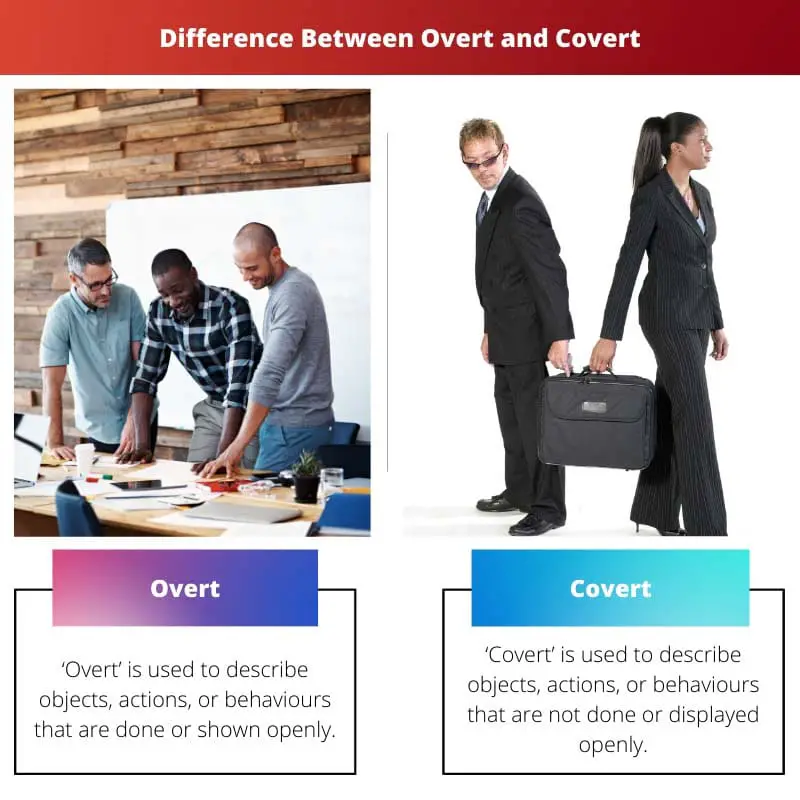Overt and Covert are two adjectives that are used to describe objects, actions, and behaviours.
Key Takeaways
- Overt actions are visible, open, and obvious, while covert actions are hidden, secretive, or disguised.
- Overt communication is clear and direct, whereas covert communication relies on indirect, subtle cues or nonverbal signals.
- Covert behavior can be used for espionage, surveillance, or other secretive purposes, while overt behavior is transparent and easily observable.
Overt vs Covert
In the English language, overt refers to the outward, observable behaviour, action or object. It is a visible action such as smiling, dancing or sighing. Covert refers to the hidden, non-observable action, object or behaviour. These include thoughts, feelings, dreams and memories.

Overt refers to an object, action, or behaviour that can be easily detected by others. Its literal meaning is to be visible or apparent.
Like in the case of overt, covert is an adjective that can be used to describe objects, actions, and behaviours.
Comparison Table
| Parameters of Comparison | Overt | Covert |
|---|---|---|
| Meaning | ‘Overt’ is used to describe objects, actions, or behaviours that are done or shown openly. | ‘Covert’ is used to describe objects, actions, or behaviours that are not done or displayed openly. |
| Visibility | Something that is overt is visible to others and easily detectable. | Something that is covert is not detectable or visible to others. |
| Inclusions | Overt behaviours include physical gestures, actions, and facial expressions. | Covert behaviours include thoughts and other mental processes. |
| Manifestation | Overt behaviour comes into existence because of covert behaviour. | Covert behaviour creates or produces overt behaviour. |
| Example | Examples of overt include physical expressions such as walking, dancing, eating, running, etc. | Examples of covert behaviour include mental processes such as thoughts, dreams, memories, cognition, reasoning, etc. |
What is Overt?
The term ‘Overt’ is an adjective that can be used to describe an object, action, or behaviour that is detectable or visible to others.
All these actions are easily observable and are thus described as ‘overt’. They can be easily seen or heard by those who are watching.
Most of the time, overt is used to describe something that is very physical in nature.
Examples of sentences that include ‘overt’ are –
“The child shows overt signs of depression and thus needs to be treated as soon as possible”. (Overt is used to describe depression as the signs are shown openly).

What is Covert?
Covert is the antonym of the adjective ‘overt’. The word can be used to describe something that is not visible or apparent.
The word ‘covert’ has its origins in the French language, in which it refers to something that is covered or obscure.
These include thoughts, dreams, reasoning, cognition, memories, etc. Such covert processes may or may not manifest into physical reality, where they become overt.
Examples of sentences that include ‘covert’ are –
“My mother tried very hard to keep the surprise covert, but she failed miserably”. (Covert is used in this sentence to imply that the surprise was hidden).

Main Differences Between Overt and Covert
- Overt behaviours include verbal expressions, facial expressions, and gestures, while covert behaviours include mental processes.
- Something that is overt requires the participation of others, while something that is covert does not.

- https://onlinelibrary.wiley.com/doi/abs/10.1111/1467-9612.00006
- https://books.google.com/books?hl=en&lr=&id=sBVGAYCh_9AC&oi=fnd&pg=PA245&dq=overt+vs+covert&ots=Qo2GY6bfRG&sig=jyegH2h_O-oOmub16y8RUL5vYCU

Another great read! The topics are well explained. Excellent work!
I was already aware of these differences. Not enough novelty for me.
This is fantastic. Extremely clear and well-written!
Very thorough and informative post! I learned a lot from this. Thank you for sharing!
I think this post is too elementary for its own good.
This is a good comparison, I think it would be useful to find practical examples as well.
I agree, some samples would help to understand it better.
Great post for someone beginning to learn about this topic. It is very clear.
This really clarified a lot of concepts that were unclear to me. Thanks!